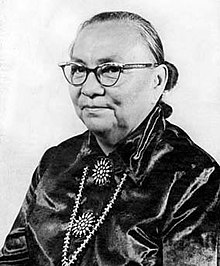Annie Dodge Wauneka | |
|---|---|
 | |
| Born | Annie Dodge April 11, 1910 Deer Spring, near Sawmill, Arizona Territory, U.S. |
| Died | November 10, 1997 (aged 87) Toyei, Arizona, U.S. |
| Nationality | Navajo Nation |
| Known for | Native American activist |
| Office | Navajo Nation Council |
| Spouse |
George Wauneka
(m. 1929; died 1994) |
| Children | 6–10 |
| Parent(s) | Henry Chee Dodge K'eehabah |
| Awards | Presidential Medal of Freedom Navajo Medal of Honor Indian Council Fire Achievement Award |
Annie Dodge Wauneka (née Dodge; April 11, 1910 – November 10, 1997) was an influential member of the Navajo Nation as member of the Navajo Nation Council.[1] As a member and three term head of the council's Health and Welfare Committee, she worked to improve the health and education of the Navajo. Wauneka is widely known for her countless efforts to improve health on the Navajo Nation, focusing mostly on the eradication of tuberculosis within her nation. She also authored a dictionary, in which translated English medical terms into the Navajo language.[2] She was awarded the Presidential Medal of Freedom in 1963 by Lyndon B. Johnson as well as the Indian Council Fire Achievement Award and the Navajo Medal of Honor.[3] She also received an honorary doctorate in Humanities (public health) from the University of New Mexico.[4][5] In 2000, Wauneka was inducted into the National Women's Hall of Fame.[6]
- ^ Martinez, Donna; Williams Bordeaux, Jennifer L. (2017). 50 Events That Shaped American Indian History: An Encyclopedia of the American Mosaic [2 Volumes]. Santa Barbara, CA: Greenwood. pp. 452–457. ISBN 9781440846496.
- ^ "Wauneka, Annie Dodge | Arizona Health Sciences Library". ahsl.arizona.edu. Retrieved October 6, 2020.
- ^ Niethammer, Carolyn J. (2006). Keeping the rope straight : Annie Dodge Wauneka's life of service to the Navajo. Jessie Ruffenach. Flagstaff, Ariz.: Salina Bookshelf. pp. 82, 104. ISBN 978-1-893354-72-2. OCLC 61651810.
- ^ Native American women : a biographical dictionary. Gretchen M. Bataille, Laurie Lisa (2nd ed.). New York: Routledge. 2001. p. 329. ISBN 0-203-80104-0. OCLC 54026385.
{{cite book}}: CS1 maint: others (link) - ^ Neithammer, p. 98
- ^ "Wauneka, Annie Dodge". National Women's Hall of Fame. Retrieved March 29, 2022.